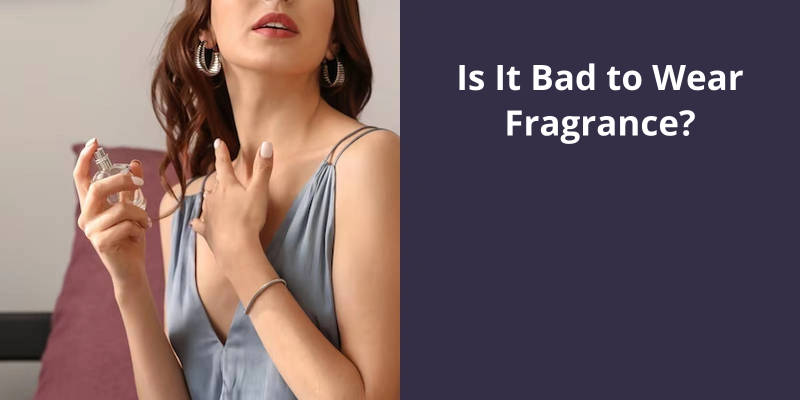Wearing fragrance isn’t bad in itself. In fact, it is quite the opposite as it can boost one’s confidence and mood, and evoke certain emotions. However, it’s important to be considerate of others when using fragrance as some people might be allergic or sensitive to certain scents. Overusing fragrance can also overwhelm others or become offensive due to the potent smell. Moreover, there may be certain situations or places like offices, hospitals, or small, enclosed spaces, where strong fragrances might not be appropriate. So, it’s not bad to wear fragrance, but it should be used mindfully and sparingly.

Is It Better Not to Wear Perfume?
The use of fragrances can have various negative effects on both the wearer and those in close proximity. When you spritz perfume or cologne into the air, it releases particles that can irritate your skin and eyes. The chemicals and ingredients in these fragrances can cause allergic reactions or even trigger asthma attacks in sensitive individuals.
Moreover, wearing fragrance can also impact the people around you. Many perfume wearers inhale a significant amount of the product, which can lead to respiratory issues over time.
Furthermore, the strong scents emitted by fragrances can be disruptive in certain environments, such as workplaces or public spaces. People with scent sensitivities often experience headaches, migraines, or other physical discomfort when exposed to strong perfumes or colognes. Additionally, others may simply find the overpowering smell unpleasant and distracting.
While it may be important for some individuals to express their personal style or enhance their confidence through scent, there are alternative options to traditional perfumes and colognes. These include more natural or hypoallergenic alternatives, or even opting for scent-free products altogether.
Are fragrance oils bad for your health? This is a question that many people have been asking, especially with the growing popularity of essential oils and natural fragrances. It’s important to note that fragrance oils are generally considered safe to use if used as intended. They can add an uplifting and fragrant note to your day, whether it’s through candles, diffusers, or personal care products. However, it’s always important to be mindful of your own reactions and potential sensitivities. If you experience irritation or any adverse effects when using a product that contains fragrance oils, it’s best to discontinue use and consult with your primary physician for further advice.
Are Fragrance Oils Bad for Your Health?
Wearing fragrance can be a wonderful way to express your personal style and enhance your mood. However, it’s important to use fragrance oils responsibly and be aware of any potential risks they may pose to your health.
Some individuals may be more sensitive to certain ingredients found in fragrances, such as essential oils or synthetic fragrance compounds. If you experience any redness, itching, or discomfort after applying a fragrance oil, it’s advisable to discontinue use and consult a healthcare professional.
Phthalates are chemicals often used to enhance the longevity and diffusion of scents. While the use of phthalates in fragrance oils is regulated in many countries, some concerns have been raised about their potential impact on hormone disruption and reproductive health. To mitigate any potential risks, it’s advisable to choose fragrance oils that are labeled as phthalate-free.
Some ingredients in fragrance oils, such as certain types of alcohols or essential oils, can have a drying or irritating effect on the skin. It’s important to be mindful of the overall ingredients in the products you use and to ensure that they’re compatible with your chosen fragrance oil.
It’s always a good idea to patch test new products before applying them to your entire body and to seek professional advice if you’ve any concerns or experience adverse reactions.
The Difference Between Natural Fragrance Oils and Synthetic Fragrance Oils
When it comes to fragrances, there are two main types: natural fragrance oils and synthetic fragrance oils.
Natural fragrance oils are derived from botanical sources such as flowers, fruits, and herbs. These oils are extracted from the plant material using various methods, including distillation and cold pressing. Since they’re derived from natural sources, they often have a more authentic and complex scent profile.
On the other hand, synthetic fragrance oils are created in a lab using a combination of chemicals. These chemicals are designed to mimic the scent of natural ingredients. Synthetic fragrances can be more consistent in their scent since they’re made using precise formulas, but some people may find them less appealing or more artificial.
Whether natural or synthetic fragrance oils are “bad” to wear depends on individual preferences and sensitivities. Some people may have allergies or sensitivities to certain fragrances, regardless of whether they’re natural or synthetic. Additionally, some synthetic fragrances may contain potentially harmful chemicals, although regulations vary by country and manufacturer.
In summary, the choice between natural and synthetic fragrance oils is a matter of personal preference and sensitivity. It’s important to consider any potential allergies or sensitivities and to choose fragrances that align with individual preferences and values.
While fragrance may not be a concern for everyone, those with sensitive or acne-prone skin and chronic skin conditions like eczema should exercise caution when it comes to using fragranced skincare products. This is because the fragrance can potentially exacerbate irritation and sensitivity in these cases, as confirmed by Dr. Acharya.
Should You Avoid Products With Fragrance?
Fragrance has become a common ingredient in many personal care and household products. However, the question arises: should you avoid products with fragrance? The answer, as with many things, isn’t black and white. It all depends on your individual circumstances and sensitivities.
For some people, fragrance can be a trigger for skin allergies or irritations. Those with sensitive or acne-prone skin types and chronic skin conditions, such as eczema, should try to avoid fragranced skin care, as it may further irritate their delicate skin. Dr. Acharya, a dermatologist, explains that fragrance in skincare can cause flare-ups and worsen existing skin conditions.
On the other hand, not everyone experiences sensitivity to fragrance. It all comes down to personal tolerance and preference.
However, it’s important to note that fragrance isn’t just limited to skincare products. It’s also found in household cleaners, laundry detergents, and air fresheners, among others. When it comes to these products, it may be wise to err on the side of caution.
As with any personal care or lifestyle choice, understanding your own body and what works best for you is key.
Fragrance and Mental Health: Examine the Potential Impact of Fragrance on Mental Health and Well-Being. Discuss the Use of Fragrance in Aromatherapy and It’s Potential Benefits for Relaxation and Mood Enhancement.
- The impact of fragrance on mental health and well-being
- The use of fragrance in aromatherapy
- Potential benefits of fragrance for relaxation
- Potential benefits of fragrance for mood enhancement
In addition to enhancing your personal hygiene, wearing cologne can have numerous other benefits for your overall well-being. The subtle and pleasant scent can help alleviate stress, anxiety, or even symptoms of depression.
What Are the Benefits of Wearing Cologne?
Is It Bad to Wear Fragrance?
Wearing fragrance, such as cologne, has numerous benefits that go beyond just smelling good. First and foremost, wearing cologne can make you feel more hygienic and confident. The pleasant scent masks any potential body odor, leaving a positive impression on those around you. By eliminating self-consciousness about unpleasant smells, you can focus on your interactions and activities without worry.
Beyond hygiene, fragrances have been known to have a positive effect on mental health. Certain scents can help ease stress, anxiety, and even depression. The olfactory system, responsible for our sense of smell, is closely linked to the limbic system in our brain, which controls emotions and memories. Therefore, the right fragrance can have a calming and uplifting effect, boosting overall well-being and enhancing mood.
The right scent can become a part of your identity, contributing to the way you present yourself to the world. It can be a form of self-expression, reflecting your personality and adding an extra layer of allure. When you feel good about the way you smell, it can positively impact your self-esteem and interactions with others.
Moreover, certain fragrance ingredients have been known to offer aromatherapy benefits. For example, essential oils like lavender or chamomile have calming properties that can help relax the mind and promote better sleep. A spritz of cologne containing these oils can provide a subtle and continuous source of aromatherapy throughout the day, helping you stay centered and focused.
The Different Types of Fragrances and Their Effects: Discussing the Various Categories of Fragrances (e.g., Floral, Citrus, Woody) and How Each Type Can Have Different Effects on Mood and Well-Being.
- Floral fragrances:
Floral scents are often associated with femininity and evoke feelings of romance, happiness, and serenity. They’re known for their calming and relaxing effects on mood. -
Citrus fragrances:
Citrus scents, such as lemon, orange, and grapefruit, are refreshing and energizing. They can help boost mood, increase focus, and promote a sense of alertness. -
Woody fragrances:
Woody scents, like sandalwood, cedarwood, and patchouli, are warm and earthy. They’re often used in aromatherapy to create a sense of grounding and promote relaxation. -
Spicy fragrances:
Spicy scents, such as cinnamon, clove, and ginger, are invigorating and uplifting. They can stimulate the senses, increase feelings of warmth, and enhance overall well-being. -
Fresh fragrances:
Fresh scents, like sea breeze or rain, are clean and revitalizing. They can help improve mood, reduce stress, and create a sense of rejuvenation. -
Oriental fragrances:
Oriental scents, such as vanilla, amber, and musk, are warm and sensual. They’re often associated with luxury and can evoke feelings of comfort and sensuality.
However, it’s important to note that fragrance-free doesn’t necessarily mean odorless. Some products may have natural odors from their ingredients, but they’re specifically formulated to be free of added fragrances that can cause irritation or allergic reactions. So, when it comes to facial and delicate areas like the neck and eyes, it’s best to opt for fragrance-free options to minimize any potential risks.
Is It Okay to Use Products With Fragrance?
Using fragrance products can be a personal choice, but when it comes to skincare, it’s important to be cautious. The delicate skin on our face, neck, and around the eyes is more susceptible to potential irritants, making it essential to opt for fragrance-free products. Fragrances can often contain multiple ingredients, many of which can cause irritation or allergic reactions. Therefore, it’s preferable to go for fragrance-free options, especially for areas with thinner, more sensitive skin.
When it comes to body products, the skin tends to be thicker and less sensitive. Keeping the skin healthy and free from unnecessary irritants should always be a top priority, regardless of the area being treated.
It’s also worth noting that not all fragrances are created equal. On the other hand, some natural essential oils can offer therapeutic benefits, promoting relaxation and overall well-being. Therefore, it’s crucial to read labels and choose products with ingredients that are safe and beneficial for the skin.
When it comes to body products, choosing products with minimal fragrance content can also be beneficial. Always prioritize the health and well-being of your skin, and make informed decisions when it comes to fragrance usage.
The Potential Health Risks of Using Products With Fragrance
- Allergic reactions
- Asthma attacks
- Headaches
- Migraines
- Skin irritation
- Dermatitis
- Respiratory problems
- Chemical sensitivities
- Hormonal disruption
- Neurological effects
- Cancer risks
- Endocrine disruption
Conclusion
In conclusion, while wearing fragrance can be a pleasant way to enhance personal grooming, it’s important to strike a balance and be mindful of it’s potential negative effects. Additionally, it may indicate a disconcerting lack of olfactory sensitivity or even serve as a subtle manifestation of underlying mental health concerns such as depression.





